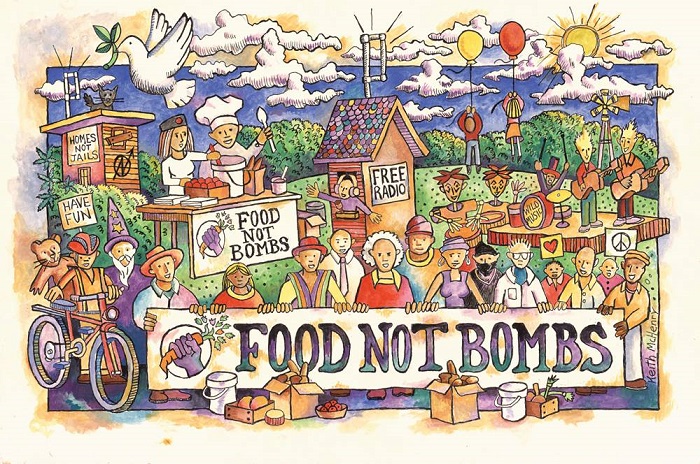 When Keith McHenry’s phone rings, it may be people calling the Hunger Hotline. The toll free 800 number assists callers in locating their local Food Not Bombs chapters, offers tips on how to collect and cook food, how to start a local chapter, and what to do if the police try to stop your group from sharing food and other information about Food Not Bombs.
When Keith McHenry’s phone rings, it may be people calling the Hunger Hotline. The toll free 800 number assists callers in locating their local Food Not Bombs chapters, offers tips on how to collect and cook food, how to start a local chapter, and what to do if the police try to stop your group from sharing food and other information about Food Not Bombs.
“We receive from five to 20 calls a day from callers all over North America,” McHenry said. “Questions range from people looking for food, information on how to volunteer with their local group to reporters wanting to interview a Food Not Bombs volunteer.”
McHenry is the co-founder of the global movement Food Not Bombs. He also maintains the organization’s website, help individuals start local groups, speaks publicly about the organization, interviews with the media, college students and other academics. He is also one of the volunteers that fills t-shirt and other merchandise orders.
“I was an art student at Boston University and worked mornings in the produce department of a local natural food grocery called Bread and Circus,” he said. “I felt guilty throwing away so much less-than-perfect produce so I started taking it to the nearest public housing project.”
Active in over 1,000 cities in 65 countries, Food Not Bombs is now a worldwide organization of volunteers that primarily recovers food that cannot be sold, prepares vegan meals to share on the streets, and organizes to affect societal change with an aim to eradicate hunger, homelessness, and improve availability of healthcare and education. Among those many worldwide chapters are three Utah-based chapters: one based in Provo and two based within Salt Lake City.
Founded in the early 2000s, the Salt Lake City chapters of Food Not Bombs self-describe as a loose-knit group of independent collectives, serving free vegan and vegetarian food to others and notes that the group exhibits a form of franchise activism.
“It started out with folks cooking food and distributing it like that, but we soon realized we didn’t have the capacity to cook all the time, but we did have the time and the networks to organize grocery pick-ups,” said Food Not Bombs SLC chapter members Cole Armstrong and Ella Mendoza, via email. “We get donations from local grocery stores, and often rescue the food before it goes to waste. Some donations even come from trees in people’s backyards.”
Starting in Cambridge, Mass. in May 1980, the Food Not Bombs movement began as a response to the policies being proposed by Ronald Reagan’s presidential campaign. His supporters wanted to adopt policies that would make deep cuts in social programs and huge increases in federal funding for the military. McHenry says that these changes that were ultimately made starting in 1981, drove millions of Americans into homelessness and poverty, dramatically increasing hunger.
A second Food Not Bombs group formed in San Francisco in 1988. In August of that same year, police began arresting the volunteers for “making a political statement.” These arrests inspired people to form Food Not Bombs chapters in their own cities.
“Our participating in protests and disaster relief has been an important part of our work,” McHenry said. “We provided food to people participating in environmental protests, support for indigenous communities’ efforts to stop nuclear power and the nuclear arms race, animal suffering and industrial agriculture, genetic engineering, police violence, government repression of the homeless, attacks on democracy, racism; homophobia, sexism, the exploitation of workers, the prison system and many other social ills.”
In 1992, Food Not Bombs held its first world gathering in San Francisco. The participants agreed to three essential principles of the organization, which still unites the organization today. First, that the food is vegan or vegetarian and free to anyone rich or poor, stoned or sober. Second, that every group is autonomous and independent. That there would be no leaders, presidents, directors or headquarters making decisions using the consensus process and strive to include those depending on Food Not Bombs for food to participate in the decision-making process. The third principal was that Food Not Bombs is not a charity and is dedicated to taking nonviolent direct action to change society so no one would go hungry or be forced to live on the streets.
“The people that come to Food Not Bombs come from all sorts of different backgrounds,” Armstrong and Mendoza said. “They’re migrants, they’re locals, they’re punks, they’re elders, and young, we have little kids come with their families and they get so excited when they see the food, especially the fruit.”
In addition to delivering meals to those who need them, Food Not Bombs chapters around the world have lead workshops on basic organizing and details of how to organize a campaign of protest and nonviolent direct action. They also hold related workshops on community gardening, silk screening, puppet making, bicycle maintenance, canning and fermentation, cooking, composting, the use of consensus decision making and many other skills.
“Food not bombs is more than an event, it’s a lifestyle, the best way to take care of one another and to build community is to take things into our own hands, DIY you know?” Armstrong and Mendoza said. “And by doing this ourselves, we’re not just building community, we’re building community power.”
FOR MORE COMMUNITY ORIENTED STORIES GO HERE





